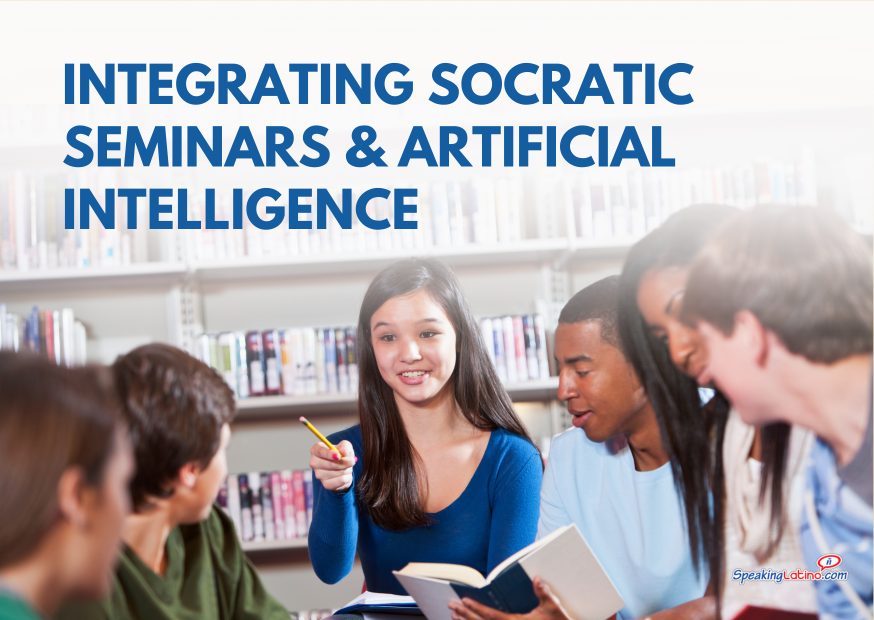
The content of this article is based on the presentation, Socratic Seminars and AI in the Spanish Literature Class by María Gloria Borsa, which was part of the World Language Teacher Summit.
Socratic Seminars Meet AI
The way we teach advanced language and literature classes is changing a lot, thanks to more interactive and engaging methods. One standout approach is the Socratic Seminar, which really helps students dive deep into literary analysis.
Socratic Seminars are even more impactful when combined with the strategic use of artificial intelligence (AI), enhancing both the preparation and execution of educational activities within the classroom. This synergy not only aligns with current educational needs but also sets a forward-thinking standard for future pedagogical approaches.
Benefits of Socratic Seminars
Socratic Seminars are rooted in the principles of inquiry-based learning, where the teacher acts more as a facilitator than a traditional instructor. This method pivots around student-led discussions that are based on pre-assigned texts, during which students are encouraged to examine, question, and discuss complex literary themes and ideas.
The primary goal is to develop critical thinking skills and a deeper understanding of the material, empowering students to form their own interpretations and engage in meaningful dialogue about the texts. The shift towards a student-centric approach not only democratizes the classroom dynamics but also places a high value on personal insight and peer-to-peer learning.
Socratic Seminars in Advanced Spanish Classes
The advanced Spanish literature courses, such as AP Spanish Literature and Culture and the Spanish Language B IBHL, are prime candidates for the application of Socratic Seminars. These courses demand a high level of linguistic proficiency and literary analysis, making them well-suited for a method that encourages deep textual engagement and thoughtful discussion. The complexity of the literature studied in these courses requires a nuanced approach to discussion, which is effectively facilitated through the Socratic method.
Socratic Seminars get students really involved in analyzing literature by creating a space where they can dive into texts, share their interpretations, and have meaningful discussions. With open-ended questions and dialogue, students are encouraged to think deeply about the themes, characters, and literary devices in the texts. This active participation pushes them to express their thoughts, defend their views, and consider different perspectives, leading to a richer understanding of the literature.
Plus, the collaborative aspect of Socratic seminars means students learn from each other, share insights, and explore the complexities of the texts together, boosting their analytical skills and deepening their appreciation for Spanish literature.
Organizational Strategies and AI
The organization of Socratic Seminars requires meticulous planning, where the educator must select themes, prepare guiding questions, and provide supportive materials that align with the curriculum goals.
AI tools such as ChatGPT and Canva significantly streamline this process. These tools can be programmed to develop questions and materials based on specific literary themes and texts, allowing educators to customize their preparation efficiently. This technological support not only conserves valuable preparation time but also enhances the quality of the materials prepared, ensuring that they are both comprehensive and pedagogically sound.
Enhancing Classroom Engagement with Structured Discussions
The practical application of Socratic Seminars involves multiple phases, beginning with individual or group analysis of texts followed by collective discussions. These discussions are structured to ensure that every student contributes to the conversation, with specific prompts and questions guiding their discourse.
Documentation of each student’s contributions is critical and is facilitated by forms that track who speaks, cites textual evidence, and asks relevant questions. This methodical tracking not only helps in assessing participatory engagement but also in evaluating the depth and relevance of each contribution.

Assessment and Reflective Practices
Post-seminar activities often involve reflective questioning, where students critique the session and their own performance, pondering questions like what was the most compelling argument made by a peer, or what they themselves could have added to the discourse.
This reflective practice not only reinforces the content discussed, but also encourages a meta-cognitive evaluation of the discussion processes and outcomes.
FAQs About Socratic Seminars and AI
How can Socratic Seminars be used in language classes?
Socratic Seminars can be effectively used in language classes to enhance students' language proficiency, critical thinking skills, and cultural understanding. Here's how:
- Language Practice: Socratic Seminars provide students with opportunities to engage in meaningful discussions in the target language, improving their speaking and listening skills.
- Critical Thinking: By analyzing and discussing literary texts during Socratic Seminars, students develop critical thinking skills as they evaluate different perspectives, make connections between ideas, and draw conclusions based on evidence from the texts.
- Cultural Exploration: Socratic Seminars allow students to explore cultural themes, values, and perspectives embedded in the texts, helping them gain a deeper understanding of the cultural context in which the language is used.
- Collaborative Learning: Through collaborative discussions in Socratic Seminars, students learn to communicate effectively, respect diverse viewpoints, and work together to construct meaning, fostering a sense of community and shared learning.
- Vocabulary Development: Socratic Seminars can also aid in vocabulary development as students engage in discussions using specialized literary terms and expressions related to the texts being analyzed.
What role does artificial intelligence play in planning and organizing these Socratic Seminars?
Here are some ways in which AI can help in the planning the process:
- Generating Questions and Vocabulary: AI tools like ChatGPT can assist teachers in generating a list of thought-provoking questions and relevant vocabulary tailored to the texts being studied, saving time and ensuring the quality of discussion prompts.
- Creating Socratic Centers: AI can help create Socratic centers quickly by generating questions, vocabulary lists, and discussion prompts based on specific themes or topics, allowing teachers to focus on facilitating meaningful discussions rather than spending time on preparation.
- Adapting Materials for Different Levels: AI can adapt questions and discussion prompts to suit the proficiency levels of students, making it easier for teachers to customize the content for different classes or language levels.
- Enhancing Efficiency: AI tools can streamline the planning process by automating certain tasks, such as organizing materials, generating discussion points, and providing language support, allowing teachers to allocate more time to engaging with students during the seminar.
- Personalized Learning: AI can analyze student responses during Socratic seminars to provide personalized feedback, identify areas for improvement, and tailor future discussions to meet individual learning needs.
By using AI technologies in planning and organizing Socratic Seminars, teachers can create more engaging learning experiences, and facilitate deeper student engagement in literary analysis and language exploration.

The practical application of Socratic seminars involves structured discussions to ensure that every student contributes to the conversation
Which courses are recommended for implementing Socratic seminars in the Spanish language curriculum?
Socratic seminars are particularly well-suited for advanced language courses that focus on literary analysis and critical thinking skills. In the context of the Spanish language curriculum, the following courses are recommended for implementing Socratic seminars:
- AP Spanish Literature and Culture: The AP Spanish Literature and Culture course is an ideal setting for Socratic seminars due to its emphasis on analyzing literary texts, exploring cultural themes, and developing critical thinking skills . The course's focus on advanced literary works provides rich material for in-depth discussions and textual analysis.
- Spanish Language B IBHL: The Spanish Language B IB Higher Level (IBHL) course is another suitable option for incorporating Socratic seminars into the curriculum . As the course includes literary texts as part of its internal assessment, Socratic Seminars can help students engage with the texts on a deeper level and enhance their language proficiency through meaningful discussions.
These advanced courses offer a platform for students to delve into Spanish literature, engage in critical analysis, and develop their language skills in a collaborative and student-led environment.
Blending Old-School and New-Age Tools
Enhancing Socratic Seminars with AI tools into Spanish literature classes is a game-changer for boosting students' understanding and analysis of texts. This method not only helps them excel in tough exams but also fosters a lasting love for literature.
As education keeps evolving, blending old-school and new-age tools will definitely make learning more enriching. This way, students get a well-rounded prep for both school and real-life challenges.
Discover more language teaching techniques to help you in your classroom.